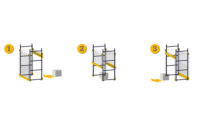The supply chain industry is often discussed as one of the most promising instances of using blockchain technology, with more potential and tangible benefits for widespread adoption than cryptocurrencies. To understand why this is so, here's some key characteristics of the technology and when its application makes sense.
Blockchain means neutrality
If companies decide to share data along the supply chain, for certification purposes, for example, they need to entrust their data to a third party. Some companies are reluctant to do so, as it means giving this third party a competitive advantage. When this third party acts as a central institution, it is in a position to gather more information than all other parties.
With blockchain, trust is no longer dependent on one particular (third-party) institution, but is embedded in the technology. What makes blockchain so groundbreaking is the fact that data is not held in one central place. Rather, it is copied on a number of computers that act as nodes on a network. Even if any number of given actors wanted to conspire to alter data, they could not do so without someone noticing. This is the beauty of decentralization; no one actor holds the keys to changing the truth. Trust is no longer dependent on a particular institution. Instead, it becomes embedded in the technology itself.
Why this matters for cold supply chains
Global supply chains resemble sophisticated networks, but with that comes opacity and information asymmetry. Add to that the fact that there are multiple data standards and interoperability issues between IT systems, and it becomes clear that the system is ripe for innovation.
An opportunity for brand protection
The technology may be young, but its development is rapid. There is a lot of collaboration happening in the space amongst startups focusing on the actual technology and large companies looking at how to integrate this promising technology to their supply chains. In fact, most Fortune 500 companies are already implementing projects based on the blockchain.
In the refrigerated food sector, ensuring a constant temperature and that the cold chain is never broken is critical. Blockchain protocols can incorporate data from various sources and carriers, including smart sensors and other Internet of Things (IoT) technology to provide information about the cold chain. When the information is recorded on a blockchain, it becomes much harder to tamper with the documentation since the data cannot be changed without someone noticing. It is an opportunity, especially for premium brands, to give their consumers greater insight and foster their position. Based on the same technology setup, organizations can also implement more effective internal controls and enable faster alert systems and recalls.
Everyone is in need of elevating their level of service, ensuring safety of products and diminishing inefficiencies. Cold chain logistics for a single product can be provided by several different companies (especially in international logistics). In those cases, aligning responsibility and accountability is crucial and a neutral way of ensuring integrity of claims is a way to that.
In order to successfully implement the technology, we cannot avoid the human factor. There are two impediments to trust—bad character and bad data. One can never overcome bad character. However, by providing solutions that promote and increase transparency on a global level and give incentives to both companies and consumers to share more data along the supply chains, making them more transparent, we can bring trust to a higher level.



